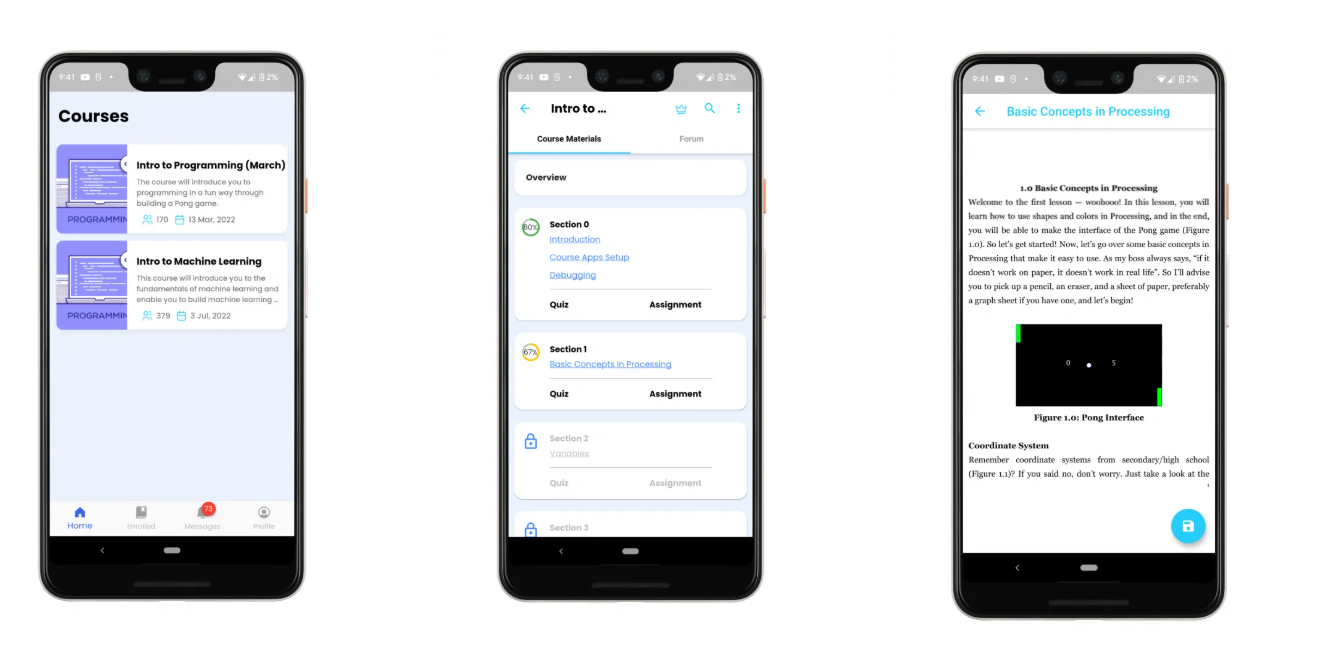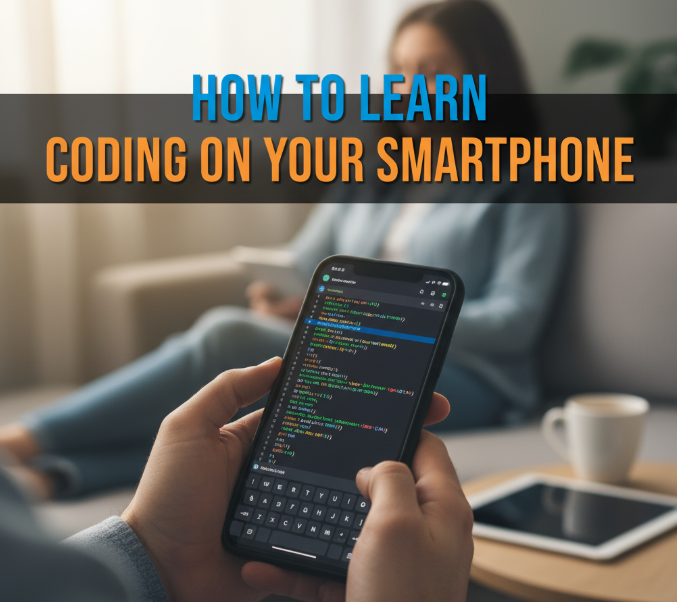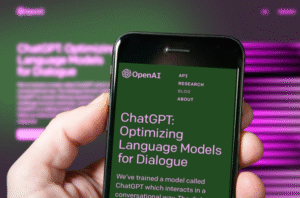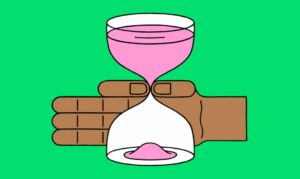Your phone is no longer just for scrolling through social media or watching videos. It might be your own coding classroom that you carry in your pocket. Whether you’re standing at a bus stop, lounging in your room, or sitting in a café, you can use your smartphone to become a programmer. Here is how you can begin your coding education with nothing more than a phone.
Here’s Why Your Phone Is Perfect for Learning to Code
Consider it: you don’t leave home without your smartphone. You don’t need an expensive laptop or some fancy computer to code. Your phone has all you want — a screen, internet connectivity and many thousands of learning apps. Plus, you can work on coding during those little breaks in your day that usually go by the wayside.
A number of strong developers began learning on their phone in the way to work or during lunch. The best part? Indeed, most coding apps for your phone are created in a way that makes learning playful and accessible: They demystify dense concepts, unpacking them into bite-size lessons you can complete in 5 to 10 minutes.
Choosing the Right Programming Language to Begin With
But before you start coding apps, you have to decide what language to learn first. Don’t worry, you won’t be locked into your first choice forever, but getting started in the right language will give you a head start in learning the next ones.
Python: The Beginner’s Best Friend
Python is the golden retriever of programming languages: friendly, versatile and easy to get along with. It employs plain language that one might mistake for regular English. If you do, Python is the right choice if your goal is eventually to build websites, analyze data or even make artificial intelligence programs.
JavaScript: Build Cool Things On The Web
Turn websites into something fun and interactive? JavaScript powers buttons that toggle, images that wiggle or slide across the screen and forms that check if you typed in your email address before clicking Submit. It’s all over the internet, and learning it opens up loads of job opportunities.
Learn HTML & CSS for Web Design and Development: Your Intro to a Career in Front-End Development
HTML and CSS aren’t “programming languages” technically speaking, but they’re the place that most people begin. HTML is to a website what the skeleton is to humans, and CSS makes that thing look pretty with colors, fonts and layouts. They are really easy to pick up quickly and give you fast victories that keeps you motivated.
| Language | Best For | Difficulty Level | Time to Learn Basic Skills |
|---|---|---|---|
| Python | General programming, AI, data science | Easy | 2-3 months |
| JavaScript | Websites, interactive sites | Medium | 2-4 months |
| HTML/CSS | Site structure and design | Very Easy | 2-4 weeks |
| Java | Android apps, enterprise software | Medium-Hard | 3-5 months |
| Swift | iPhone/iPad iOS apps | Medium | 3-4 months |
Best Apps to Take Your Phone and Turn It Into a Coding School
And now the fun part — downloading apps that make learning to code feel like playing a game. Here are the ones you should try best.
SoloLearn: The All-in-One Coding Champion
SoloLearn is a personal coding tutor you can even keep in your pocket! It teaches Python, JavaScript, C++, Java and plenty of other programming languages. The lessons are short and sweet, ideal for 10-minute study sessions. And you can even take on other learners from around the world and strut your coding stuff.
The app employs a concept known as “gamification,” which equals points, achievements and leveling up with learning. It makes studying seem a little less like homework and a bit more like fun.
Grasshopper: Google’s Easter Egg for New Coders
From Google, Grasshopper teaches JavaScript with logic puzzles and visual challenges. Instead of staring at dull text, you solve problems by dragging blocks of code into place. It’s great for someone who is brand new to coding and something that doesn’t feel overwhelming.
Mimo: Learn While You’re Bored
Mimo divides up coding into bite-size tutorials that last just a few minutes. You can learn web development, Python, SQL (for managing databases) and more. The app will periodically remind you to keep going, and the lessons are structured so that you’ll want to.
Enki: Daily Coding Workouts
It’s like a fitness app for your brain. It provides you with daily coding exercises and reports your progress along the way. Here you can learn Python, JavaScript, Linux, Git and other essential tech skills. The app adjusts to your pace, ensuring that you’re challenged but never frustrated.
Programming Hub: The Code Library
This app offers courses in more than 20 programming languages. From novice to experienced, the Programming Hub has something for everyone. It comes with more than 5,000 code examples and a trimmed-down compiler that allows you to run code directly on your phone to see what it does.
How to Make Your Phone a Tool for Serious Programming
Understanding the concepts behind coding is one thing, but actually typing out and running code is another. Here’s how to make your smartphone into a veritable coding machine.
Code Editors for Your Phone
You need a space in which to write your code. These apps are essentially the Microsoft Word for programming:
Dcoder provides the ability to code in all the popular programming languages, with an ability to run your own code instantly. And this one has a straightforward interface that won’t clutter your modest screen.
Spck Editor is ideal for web development. You can write HTML, CSS and JavaScript and your website will come alive, directly in the browser of your phone.
Acode – powerful code editor is an offline (and online support) mobile text editor app. You can edit files, organize projects, or even access online storage like GitHub.
Online Compilers: Running Your Code
Every now and then, you need to check if your code is functioning. Online compilers allow you to type in code and see the results right away:
Replit Mobile offers a full coding experience on your phone
JDoodle supports hundreds of languages and saves your code online
OneCompiler is clean and light UI makes it quick to use
Building Your Daily Coding Routine (Even If You Only Have 15 Minutes)
The key to learning to code isn’t hitting the books 5 hours once a week – it’s 15-30 minutes every single night. Your brain is just better when you do regular, shorter sessions than occasional long ones.
Morning Motivation
Have one coding lesson over breakfast. This brings your brain to attention — and makes you feel accomplished before you even arrive at work.
Break Time Practice
Take the little bit of free time you have in school or at work, and do quick coding challenges. Those 10-minute windows between events are ideal for knocking off a single problem of SoloLearn or Mimo.
Evening Wind-Down
Review before bed what you’ve learned during the day. Look at some code examples, or watch a quick tutorial video. This helps your brain process the information so you remember it when you sleep.
Getting Involved with Online Communities to Keep Your Motivation High
Learning alone is tough. When you are stuck on a problem or want to quit, talking to other people about it is everything.
Reddit Communities
Subreddits such as r/learnprogramming and r/coding are full of people who are in exactly your shoes—all learning how to code and supporting one another. You are welcome to ask the questions, share your projects and doing anything else you would like as long it is in accordance with experienced programmers.
Discord Servers
And most coding apps have Discord communities where your learner can chat with other studiers in real time. You can share your screen, receive real-time help and make friends on the journey.
Stack Overflow
It’s the site where coders turn when they are stuck. You can ask about almost any coding problem and there’s someone who has already fixed it. As you get more confident, you can also begin to answer other people’s questions.
Creating Real Apps on Your Phone
It’s helpful to read about coding, but you learn most when you apply it by doing some programming. Projects you can make on your smartphone:
Personal Portfolio Website
Create a website about yourself using HTML and CSS, with some JavaScript mixed in. Add your photo, interests, skills and projects. You can host it for free on GitHub Pages, and share with friends and family.
Calculator App
Make a very basic calculator that can add, subtract, multiply and divide. This will get you to input user interaction and display results.
To-Do List Application
Create an app that lets you post tasks, check them off when done and delete them once they are checked. This project gives you practice in storing data and creating interactive interfaces.
Random Quote Generator
Create a page that displays a different inspirational quote every time you click on the button. You will see how to use arrays (lists) and random selection.
Weather Display
Hook up to a free weather API and display the temperature and conditions in your favorite city. It will help you to learn, how to get data from the internet.
Dealing With Common Challenges
Every coder faces obstacles. Here’s how to get through them.
“This Is Too Hard”
When you face a concept that feels impossible, chunk it up. Don’t try to make it all clear at once. Watch multiple explanations from different teachers — sometimes someone’s explanation will click when another’s doesn’t.
“Every Time I Learn Something, I Forget It”
This is normal! Your brain needs repetition. Return and repeat old lessons. Memorize key concepts with flashcard apps such as Anki. Type out code examples, don’t just read them.
“My Code Doesn’t Work”
Welcome to programming! Even professional programmers are fixing broken code half the time. Pay attention to error messages — they tend to explain exactly what went wrong. Study your code line by line with samples that actually do work. Obtain error messages with Google—someone else has had the same problem.
Small Screen Struggles
The answer, of course: Yes, it is indeed harder to code on the phone screen. When writing code, switch to landscape mode. Make your code editor text size bigger. You could invest in a Bluetooth keyboard that connects to your phone for longer coding sessions — they’re not that expensive and will make typing much easier.
Free Resources Beyond Apps
Your phone’s web browser offers even more educational possibilities.
YouTube Channels
freeCodeCamp: Complete developer curriculum on all programming languages — completely free of charge
The Net Ninja: Web development tutorials told in short, clear videos
Corey Schafer: Awesome programming tutorials with real-world projects
Traversy Media: Project based learning that shows you how to actually make real things
Interactive Websites (Mobile-Friendly)
freeCodeCamp.org provides full certificates in a number of programming subjects. Their classes are great on phones.
Codecademy also offers interactive coding lessons on a mobile-adaptive website.
Khan Academy offers videos and practice on the basic foundations of computer science.
W3Schools – The best place on the web for learning, with try-it-yourself examples.

Keeping Tabs on Your Progress and Keeping the Faith
Set clear goals for yourself. Instead of “learn Python,” try “finish 30 lessons this month” or “make three small projects by the end of summer.”
Maintain a coding journal on your phone. Record what you learned that day, what was confusing and/or making you think, and your questions about the content or skills acquired. Watching it happen over weeks and months is highly motivating.
Participate in coding challenges (for example #100DaysOfCode) on social platforms. Upload daily about what you are learning. The accountability will keep you going and you’ll meet others learners around the world.
When to Transition From Phone to Computer
Your phone is an impressive place to start, but eventually you may want to switch over to a computer for larger projects. Here’s when:
- You’re working on complex applications with lots of files and folders
- You need professional development tools
- You’re applying to coding jobs and want some real projects to show
- There’s a lot of energy coming off your phone and it’s making you more stressed, not less
But don’t feel rushed! Many people learn the basics of coding on their phones, without ever turning to laptops. There’s no reason to change.
The Money Side: Free versus Paid Resources
Based on our research, most coding apps have free editions that are more than adequate to begin learning. The paid ones generally just eliminate ads and open up additional sets of problems.
Begin with a free option, paying for premium features only if you know you’ll use them. Many students finish entire courses without ever having to part with a penny.
If you’re low on money, consider free apps such as SoloLearn and Grasshopper or YouTube tutorials. You can have everything you need without ever opening your wallet.
Staying Safe and Healthy During Learning
Protect Your Eyes
And looking at a small screen for hours does not feel good in your eyes. You can also follow the 20-20-20 rule: every 20 minutes, look at something 20 feet away for at least 20 seconds.
Watch Your Posture
Don’t hunch over your phone. Sit or stand up straight and hold your phone at eye level. Your neck will thank you.
Take Real Breaks
And when you get frustrated, put the phone down and do something entirely different. Take a walk, play with a pet or talk to a friend. Your brain is better at solving problems when you’re not bothering it.
And After You Know the Basics
Once you’re comfortable with coding basics, there are a bazillion places to start. For more resources and guidance on advancing your technical skills and programming knowledge, explore these paths:
- Specialize in web development and become a freelancer
- Learn to make apps and build your own mobile app projects
- Discover data science and AI
- Study cybersecurity and ethical hacking
- Make games with something like Unity
- Contribute to open-source on GitHub
The skills you master on your smartphone are the ones professionals use on a daily basis. You aren’t being taught “phone coding” — you are learning true coding that works everywhere.
Your Coding Journey Starts Now
You do not need the right opportunity, perfect circumstances or expensive tools to begin practicing coding. All you need is your smartphone, your curiosity and 15 minutes a day. Every master coder was once in your place—right here, starting at their first line of code and asking themselves if they could really pull this off.
Download one of the apps that was covered here. Not tomorrow, not next week — right now. Complete one lesson. Then tomorrow, complete another. Before you realize, you will be writing programs and creating web pages, solving problems with code.
You — specifically a future you — will thank you for starting this now. That phone in your hand isn’t just a distraction — it’s one of the most effective tools you have in your quest for many of the most important skills in our modern world. So what are you waiting for? Your coding adventure begins now.

Frequently Asked Questions
Can I really become a good programmer only with my phone?
Yes, absolutely! And while people end up using computers for more difficult work, you can learn all the basics and even do real projects literally entirely on your phone. There are many accomplished devs who—good or ill—began their careers on mobile.
How long does it take to learn coding on a phone?
It’s how consistent you are and what your goals are. 4-6 weeks, you will learn some basic ideas if practice 30 minutes per day. Your first real project could take 2, or 3 months to build. And, let’s be honest, if you’re a coder, you’ll never stop learning because tech is changing every day.
Do I have to pay for code apps?
No! These apps all have excellent free versions. You can get full free courses – there are ways to do it for free. Nice to have premium features, but you don’t need all that to learn.
What programming language would I start with on my phone?
Python is the most beginner friendly of these languages, due to its ease of use. If you’re interested in making websites, learn HTML and CSS first, then JavaScript. All of these languages have excellent phone-based learning apps.
How frustrating is writing code on a smaller screen?
It can be difficult at the beginning, but you will get used to apps that are optimized for mobile with keyboards and interfaces specifically made for it. Landscape mode, adjust text size and consider a cheap Bluetooth keyboard if you want to write for more than a few minutes. Most learners adapt quickly.
Can I get a job after learning to code through my phone?
The skills you learn are the same whether doing so on a phone or a computer. But if you are doing this for work, eventually you will have need to start working on some larger projects and use a computer. Plan your transition, which you can do safe in the knowledge that, so far as technology and formality go, your phone learning provides an ideal springboard.
What if I don’t get it and get stuck?
It’s OK to get stuck! Googling your questions; asking for help in Reddit communities like r/learnprogramming; watching at least three different YouTube explanations and positive reasons for redoing earlier lessons. Every programmer struggles—it’s normal.
How much bandwidth do coding apps use?
Most of the coding apps don’t use that much data — less than 50 MB to download the app, and relatively lightweight lesson content. Lots of apps offer courses that you can download for offline studying. Use Wi-Fi wherever possible and download lessons to watch later if data is scarce.
Will I need math and stuff to learn coding?
Elementary math is useful, but you don’t have to be a math whiz. Simple arithmetic is all that most introductory coding requires. More math will help as you start moving into areas like game development or data science, but you can pick it up along the way.
Will learning on my phone restrict what I can do later?
Not at all! The logic, problem-solving ability and syntax you get used to on your phone are directly applicable to computer programming. Think of phone-based learning as your training wheels — you’re building real skills that function anywhere.



